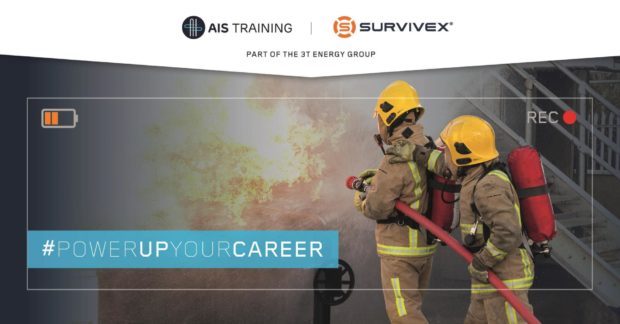Offshore environments like oil and gas platforms or wind turbines need fully qualified emergency firefighters on site in the rare event a fire breaks out. After all, you can’t just dial 999 when you are in the middle of nowhere!
Adding an offshore firefighting qualification such as OPITO’s Offshore Emergency Response Team Member (OERTM) or the Helideck Emergency Response Team Member (HERTM) can complement existing skills and help make your CV stand out from the rest.
Atlas Professionals, one of the leading recruitment companies for the global energy sector, confirmed this at Survivex and AIS Training’s recent virtual careers event.
Senior HSEQ Advisor for the Atlas Group, Mark McDonald, explains: “There are certain qualifications which are mandatory for anyone starting out in the offshore sector such as a BOSIET (Basic Offshore Safety Induction and Emergency Training) and a valid medical certificate, but other certificates can be highly desirable.
“OERTM and HERTM firefighting tickets are a great example.
“Rare offshore fires, when they do occur, can be ferocious and are often in difficult to access areas such as confined spaces and pipework valves. Legally employers are required to have professionally trained employees to deal with these situations.
“While offshore firefighting isn’t a full-time offshore role, it can be a distinct advantage to have it as an additional skill on your CV, alongside your existing qualifications.
“This can be particularly important for anyone looking to get their first job in the offshore sector.
“At the moment for example, we only have a few clients in the North Sea who don’t have Roustabouts in the fire team. Roustabout is an entry level position so any additional skills and certificates you can show an employer will help.”
Eric West from North Shields is a long-standing customer at AIS Training, and a great example of how firefighting training can enhance your CV. After many years working in offshore oil and gas Eric decided to transfer to the fast-growing offshore wind sector.
Eric said: “With no wind experience, I knew I had to do something to make my CV stand out so turned to AIS Training for help.
“I undertook a 5-day Offshore Emergency Response Team Member (OERTM) training course to add emergency firefighting to my skill set. This definitely helped me secure my first offshore wind job.
“As the only person on my rotation with emergency response skills, I became an invaluable team member and it also put my name top of the list for any new potential contracts.”
OERTM and HERTM training at AIS Training and Survivex takes place in highly realistic settings featuring helicopter simulators and purpose-built structures to replicate field conditions as closely as possible.
Within these facilities students experience the heat and smoke conditions of a real offshore fire and learn how to successfully bring the fire under control.
At the end of each course the difference in people can be astonishing. Even those who are extremely nervous and unsure of what to do in an emergency situation become confident and familiar with the equipment and techniques.
Visit the Survivex website to find out more about firefighting training.
